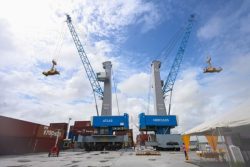Dear Editor,
For decades Guyana’s foreign policy was fashioned to concentrate on a matter of fundamental national importance, viz, the controversy with Venezuela. Almost every aspect of our external relations with the world around us was formulated with this controversy in mind.
In fact, long before our country gained its independence as a nation, British and American economic, political and ideological interests converged. In this regard, overt and covert diplomatic efforts were exerted to utilize the controversy as a sword of Damocles over the heads of a people whose long and difficult march to independence was about to be granted by the British themselves.
Since attaining independence, Guyana’s foreign policy has been strongly influenced by the border controversy with Venezuela. This was the case under every executive president since Forbes Burnham right down the corridors to the current David Granger administration. Moreover, every Foreign Minister since independence, has, like Sisyphus, rolled the stone valiantly but in vain. In this regard, experience has shown that those efforts came to naught, thus the ‘fresh approach’ by the Granger administration to approach the International Court of Justice for a final juridical settlement of the controversy.
In the meanwhile, a new socio-economic player has entered the game. With the advent of the oil and gas industry a totally new dispensation, in the true sense of the word, is likely to emerge. That particular dispensation will significantly impact and radically transform our country’s socio-economic and financial architecture.
The all-embracing influence of this industry can be both good and bad for Guyana, depending on how it is strategically positioned and managed by competent and professionally qualified Guyanese and expatriate personnel.
The challenge we face is that given the current disastrous economic and social conditions prevailing in our country and the recent Transparency International 2016 Report to the effect that Guyana remains one of the most corrupt countries in the world, to throw oil revenues down this black hole is to do precisely what wiser heads have been warning against: the self-inflicted ‘curse of oil.’
Under these circumstances, our oil and gas industry in years to come will emerge as the pre-eminent basis of the foreign policy of our country.
Assuming the ICJ issues a ruling in Guyana’s favour as it did recently in the case of the South China Sea in favour of the Philippines, implicitly, the controversy would have been finally settled by then and out of the way as nuisance value and as a distraction, so to speak, once and for all. In this situation, the government’s (whether APNU+AFC or PPP/C) attention will, by that time, be fully dedicated to a foreign policy entirely dominated by the oil and gas industry. Pursuance of such a foreign policy is fraught with many challenges if not pitfalls.
There will be fundamental adjustments in relation to this country’s traditional friends and trading partners. Our commitments and trade policy reviews at the World Trade Organization (WTO) will have to be transformed. Our multilateral and institutional (OPEC) engagements will see fundamental shifts with concomitant membership issues, while assessed contributions and commitments will be burdensome.
The change in the nature of Guyana’s relationship with the multilateral financial institutions as an oil and gas producing country should not be underestimated. Lending arrangements and grant aid by these institutions to Guyana will no doubt come up for review.
Changes in our relations with Caricom will have to be intelligently anticipated. Our country’s Gross National Product (GNP) as an oil producing country will call for a reassessment of its concomitant Treaty obligations and will inevitably result in a call for an increase in Guyana’s assessed contributions to the Community and its organs. This will no doubt be demanded by the less endowed member states of the Community.
To anticipate fundamental changes in our country’s foreign policy is therefore no wild speculation. Indeed, it will be the logical outcome of a domestic policy grounded in an economic policy fuelled by a nascent oil and gas industry.
It is to be recalled that the Minister of Natural Resources, according to the Kaieteur News of November 20, 2016 had stated: “We are in an extraordinary process of transformation of our nation. The discovery of oil alters the political, economic and social DNA of our present and future.”
In the circumstances, Minister Trotman failed to recognize, at least publicly, the complicating Tillerson factor. The Head of Exxon/Mobil is soon to be the new Secretary of State of the Trump administration. How this factor will impact the foreign policy of our country and particularly our relations with the new US administration is anybody’s guess. In any event, it is a serious matter that requires a bipartisan discussion at the highest political level.
In this connection, we need to consider a new governance practice where governments do not write the rules themselves, but define what they want those rules to achieve and ask the entity concerned that will be affected by the rules to write the rules themselves. Or the government could say to the entity, here is the required outcome…you figure out how to make it work. Or, on the other hand the government could say: you figure out what the risks are and tell us what you propose to do about them.
This is a possible approach the Granger administration could adopt at the bipartisan level in this new and challenging situation as Guyana emerges a nascent oil producing country.
At the end of the day, the Guyanese people must be the primary beneficiaries of the resources that will flow from the production of oil as part of our national patrimony.
Yours faithfully,
Clement J Rohee, MP








